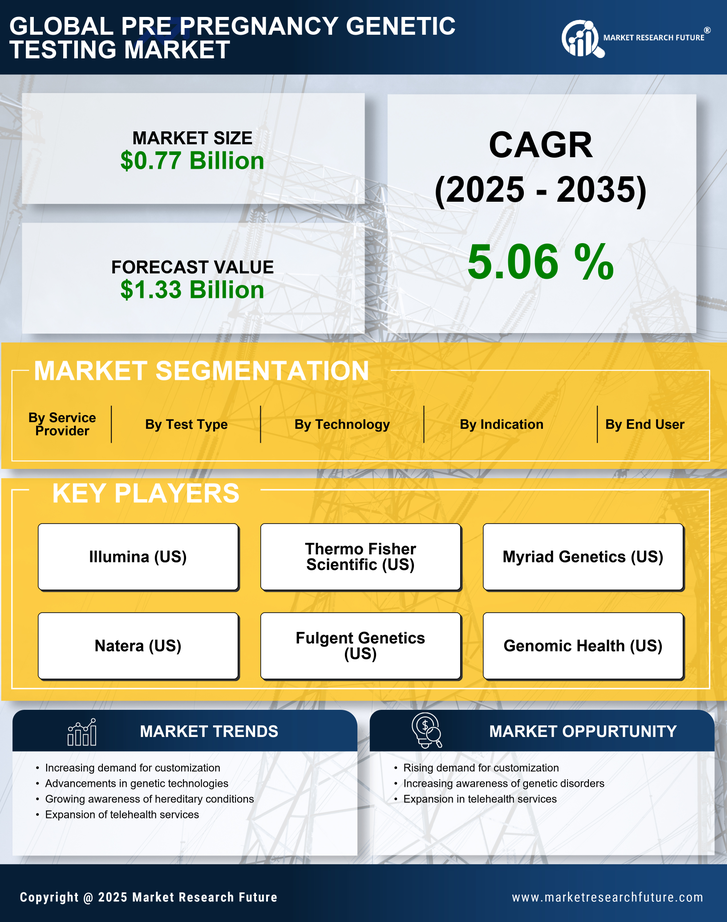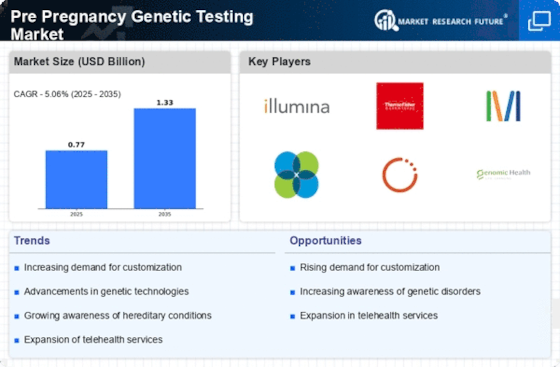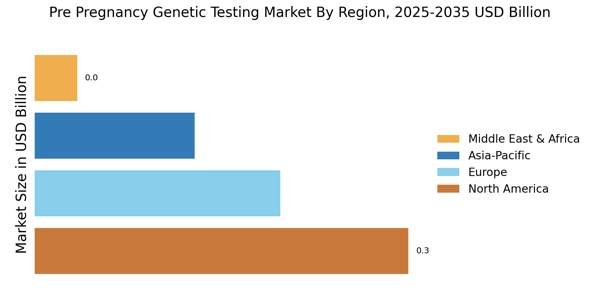Regulatory Support and Guidelines
Regulatory frameworks and guidelines are increasingly supporting the Pre Pregnancy Genetic Testing Market. Governments and health organizations are recognizing the importance of genetic testing in reproductive health, leading to the establishment of policies that promote its use. These regulations often aim to ensure the safety and efficacy of genetic tests, thereby enhancing public trust. Furthermore, initiatives to educate healthcare providers about the benefits of genetic testing are likely to increase its adoption. As a result, the Pre Pregnancy Genetic Testing Market is expected to thrive, driven by a supportive regulatory environment that encourages innovation and accessibility.
Increased Focus on Preventive Healthcare
The Pre Pregnancy Genetic Testing Market is benefiting from a heightened emphasis on preventive healthcare. As healthcare systems worldwide shift towards proactive measures, genetic testing is recognized as a vital tool for identifying potential health risks before conception. This preventive approach not only aids in reducing the incidence of genetic disorders but also aligns with broader public health initiatives aimed at improving maternal and child health outcomes. Data suggests that the integration of genetic testing into preconception care can lead to better-informed reproductive choices. Consequently, the Pre Pregnancy Genetic Testing Market is likely to see sustained growth as more individuals prioritize preventive measures.
Rising Demand for Personalized Healthcare
The Pre Pregnancy Genetic Testing Market is experiencing a notable increase in demand for personalized healthcare solutions. As individuals become more informed about genetic predispositions, they seek tailored approaches to family planning. This trend is driven by a growing awareness of genetic disorders and the potential for early intervention. According to recent data, the market for genetic testing is projected to reach substantial figures, indicating a shift towards personalized medicine. This demand is further fueled by advancements in technology that allow for more accurate and comprehensive testing. Consequently, the Pre Pregnancy Genetic Testing Market is likely to expand as healthcare providers incorporate genetic testing into routine preconception care.
Technological Innovations in Genetic Testing
Technological advancements play a crucial role in shaping the Pre Pregnancy Genetic Testing Market. Innovations such as next-generation sequencing and CRISPR technology have significantly enhanced the accuracy and efficiency of genetic tests. These technologies enable the detection of a wide array of genetic conditions, thereby empowering prospective parents with critical information. The market has seen a surge in the development of user-friendly testing kits that can be utilized at home, further driving accessibility. As a result, the Pre Pregnancy Genetic Testing Market is poised for growth, with an increasing number of individuals opting for genetic testing prior to conception.
Growing Acceptance of Genetic Testing in Society
The societal acceptance of genetic testing is a significant driver for the Pre Pregnancy Genetic Testing Market. As public awareness of genetic conditions rises, more individuals are open to utilizing genetic testing as part of their family planning process. This cultural shift is influenced by increased media coverage and educational campaigns that highlight the benefits of genetic testing. Moreover, as more success stories emerge regarding the positive impact of genetic testing on family health, the stigma surrounding it diminishes. Consequently, the Pre Pregnancy Genetic Testing Market is likely to expand as societal norms evolve to embrace genetic testing as a standard practice in reproductive health.


















